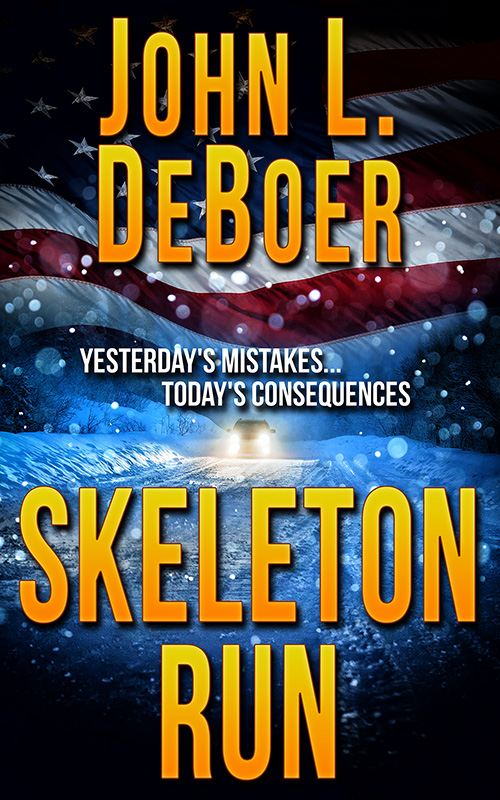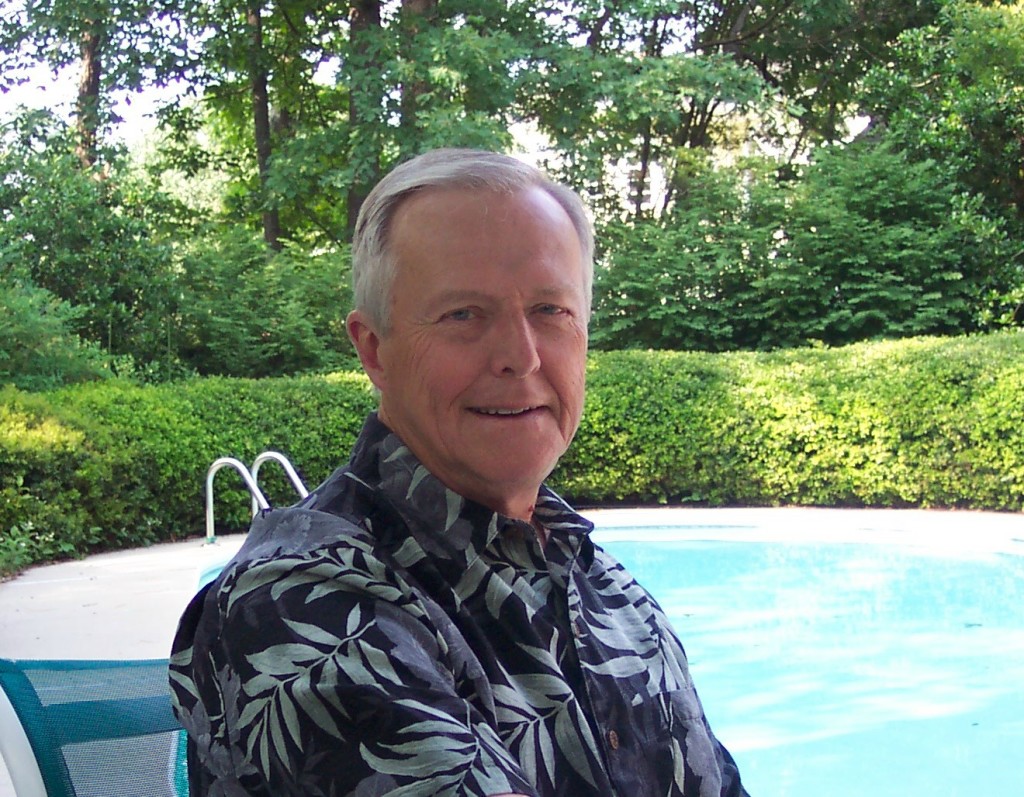I’m a political junkie, and the recent Supreme Court decisions allowing almost unlimited money to finance campaigns got the idea going for me.
John DeBoer – 21 June 2015
The Back Flap
Twenty years ago, four teenage boys left a baby behind in a crushed car after they caused the tragic accident that took the mother’s life. Ever since, they’ve guarded the secret that would’ve ruined their lives and destroyed their future careers. But when one of them succumbs to illness, a blackmailer makes contact, and the survivors realize that, somehow, someone else knows. Now, everything that matters to them is at stake.
Las Vegas billionaire Wendell Logan is pursuing the role of political kingmaker, and he’s selected his unsuspecting king: Alan Granger, governor of Pennsylvania. Granger confesses his closet skeleton to Logan, but the tycoon has invested too much time and money into Granger’s future presidential campaign to let him and his old friends endanger Logan’s power play.
It’s time to run.
About the book
What is the book about?
It’s the story of four teenage boys who cause a tragic accident and then hide this secret for twenty years until, by chance, the secret gets out and a blackmailer makes contact. One of those boys has become the governor of Pennsylvania. A Las Vegas billionaire has obsessed over being a political kingmaker and has chosen the governor to be the man he’ll put into the White House. But then the governor confesses his closet skeleton, and the billionaire, having already spent so much time and money in his quest, decides that he’ll eliminate all those who know about the secret that could doom his candidate’s presidential campaign.
When did you start writing the book?
About two years ago.
How long did it take you to write it?
A little less than a year.
Where did you get the idea from?
I’m a political junkie, and the recent Supreme Court decisions allowing almost unlimited money to finance campaigns got the idea going for me. Then I had to build a story around that, incorporating a Machiavellian strategy and various twists and turns.
Were there any parts of the book where you struggled?
Keeping my most important twist unapparent until the reveal close to the end of the story.
What came easily?
The politics, the settings, and the lifestyle and activities of the MC, who is, as I am, a physician.
Are your characters entirely fictitious or have you borrowed from real world people you know?
I always borrow from myself in some way for the MC. There are parts of me in all my stories. I just won’t say which parts. Other personalities are derived from people I’ve known, usually; sometimes they’re based on other fictitious characters I’ve read in books or seen on TV or in films. For this particular book, my politicians are based on real politicians I’ve seen in action publicly and how I think they would act in private. So yes, my characters are basically all fictional!
We all know how important it is for writers to read. Are there any particular authors that have influenced how you write and, if so, how have they influenced you?
Thrillers is my favorite genre, so that’s what I read the most. As far as influencing my writing, I’d have to put Nelson DeMille near the top of the list. Harlan Coben is up there, too. DeMille showed me that having both first person and third person in the same story works. And I’ve used Coben’s style of talking to the reader at times. Some might criticize this as unacceptable literary license, but if Coben can do it . . .
Do you have a target reader?
Anyone who enjoys escapist thriller/suspense stories as much as I do.
About Writing
Do you have a writing process? If so can you please describe it?
Once I have an idea for a story, I’ll envision a vague roadmap of where the story will go, but never – at that point – how it will end. Then I start writing. Chapter by chapter. After each chapter I stop and figure out where I’ll go next.
Do you outline? If so, do you do so extensively or just chapter headings and a couple of sentences?
I outline what I want in the next chapter or two. And that’s not more than a couple of sentences. How did you know?
Do you edit as you go or wait until you’ve finished?
I definitely edit as I go. I hate going back to “old” stuff, even if it’s mine. I’m helped in this regard by posting chapters in my workshopping site, so any miscues and typos can be caught and corrected immediately.
Do you listen to music while you write? If yes, what gets the fingers tapping?
No, but I often have the TV on in my man cave (the garage) to act as white noise and block out other distractions while I ponder the constructs of my story.
About Publishing
Did you submit your work to Agents?
Been there, done that. No longer. I’ve discovered the chance of interesting someone in your work is much higher if you eschew the agent and go directly to a publisher who, if truth be told, would rather not deal with a middleman agent. Of course, this essentially rules out any inroad to a “major” publisher.
What made you decide to go Indie, whether self-publishing or with an indie publisher? Was it a particular event or a gradual process?
Rejections! Pure and simple. I got tired of agents telling me my story didn’t “fit their list” or some such – if they bothered to respond at all to my query. So my first two novels I self-published. Now, I personally know several authors who succeeded remarkably from self-publishing. But they had to do everything themselves. Not that I’m lazy – my thirty years as a surgeon would argue against that – but when someone else can do some of the legwork, I’m happy. So that’s why I sought out indie publishers who would help with the cover design, editing, and marketing. And it’s nice to have someone with a vested interest in your success.
Did you get your book cover professionally done or did it you do it yourself?
I’ve worked with artists who have contracts with the publishers involved to give them a feel for what I envision for the cover. Then it’s up to their professional skill to create what they think would be appropriate for the story inside the cover. I’ve been pleased with the results so far, and the cover of Skeleton Run makes my case.
Do you have a marketing plan for the book or are you just winging it?
Until now, I’ve never thought much about marketing. To me, just getting my novel out there was what it was all about. Making money was the frosting on the cake, in my view. But my publisher would certainly like to profit from the book, has invested in me thinking that could happen, so it’s rubbed off on me! No more winging it! I’m now actively seeking the publicity that book aficionados like you can offer, and I’ve become much more active in social media. I haven’t gone the paid-advertising route yet, but who knows?
Any advice that you would like to give to other newbies considering becoming Indie authors?
Once you’ve written the story that you think is great, have it reviewed by people you respect and who have experience in the rules of the road . In this regard, I would get established with an active workshopping group, either locally or online. I’ve workshopped all of my novels in this way and learned a hell of a lot in the process. If your goal is to be discovered by John Grisham’s publisher, once you have a product you’re proud of you’ll then have to shop your novel around to agents. You might get lucky. But don’t let rejections discourage you. I know, every author who has had publishing success says this. But it’s true, because they’ve already gone through what the newbie has. It’s rare – maybe nonexistent – that a submission gets accepted first time out of the gate. The beauty of today’s book market is that an author no longer has to depend on the whims of agents. There are high-quality independent publishers out there who are willing to take a chance on a neophyte. And, you can always do it yourself. In fact, there is a growing number of authors who eschew traditional publishers for the freedom of total control of their products. Even some who have been published by the big houses have turned to this route. Welcome to the promising new world of book publishing!
About You
Where did you grow up?
I was born on Long Island, N.Y. and spent my boyhood in New Jersey. Then, as I was to begin high school, my family moved to Burlington, Vermont. And there I stayed until finishing medical school.
Where do you live now?
North Carolina
What would you like readers to know about you?
That I’m a retired surgeon, so the reader can know the medical things that somehow always find a way into my stories are authentic.
What are you working on now?
My current project deals with the threat ISIS poses for Americans. The tentative title is When the Reaper Comes.
End of Interview:
Get your copy of Skeleton Run from Amazon US (paper or ebook), Amazon UK (paper or ebook), or Barnes & Noble.



nice interview
Thank you to The Indie View for featuring me and my book, Skeleton Run. And thank you, bn100, for stopping by. Haven’t we crossed paths recently?
Thanks for doing it, John.